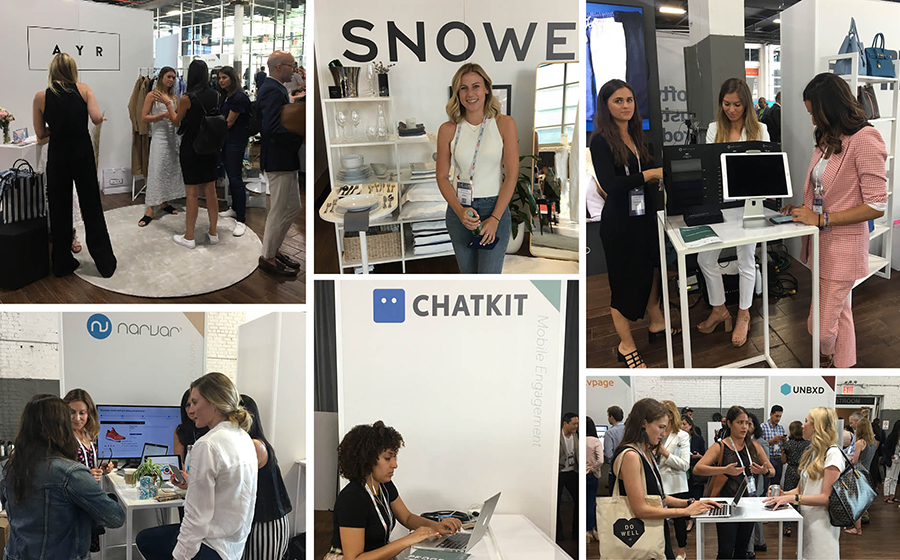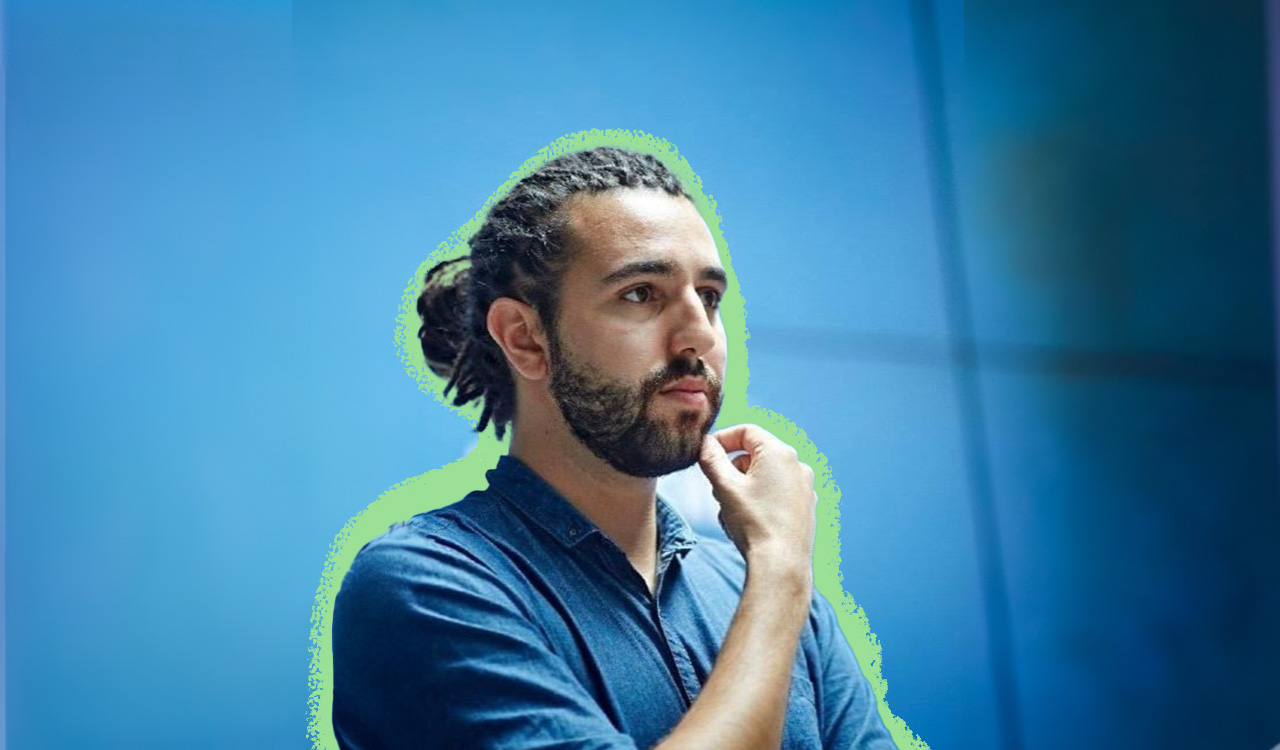How do you know when you\’re in the vortex of a retail tech summit? You\’re surrounded by stylishly dressed, enthusiastic, happy millennial-youngish men and women and their slightly older investors. These entrepreneurs exude optimism, possibility and irrepressible energy. They are living the dream of making their vision — whatever it may be from customized haircare products and self-designed apparel to repurposed luxury handbags and sustainably sourced and produced home products – a reality in both a digital and brick-and-mortar marketplace. These intelligent, fearless creative startup founders are neither worn down nor beleaguered, whether they are at the beginning of their startup journey, or on their second or third ventures.
This is where we found ourselves on July 9th and 10th at The Lead\’s Innovation Summit in Brooklyn\’s Expo Center, where over 1,000 upwardly mobile entrepreneurs gathered to connect, share artisanal snacks and beverages and experience the energy of a community of dedicated, like-minded, hopeful business owners. Many, many women entrepreneurs took the stage with clear, articulated business propositions that fuse the power of frontier technologies and AI with a clever idea to serve a range of niche consumer markets. Clearly, there is no end to imaginative, novel ideas. And threaded throughout all the conversations was a present sensibility of the value of purpose, sustainability and an empathetic company culture. Which is not to say that these nextgen retailers are trading in financial success. They are compassionate capitalists. Many have taken their previous less-than-fulfilling business experiences and transformed them into use cases never to be repeated. Many are alumni of Jet.com. The entrepreneurs reinforced the sense of urgency for the environment, the sheer joy of innovation and imagination, purpose-driven work and parity in the workplace for women.
Culture is Key
Bombas may be the startup posterchild of where to work. In six years and with over 100 employees, only four have left voluntarily. With unlimited vacation and work-from-home time, the Bombas culture is built on trust and mutual respect. CEO David Heath says it\’s critical to recognize that \”employees are humans beings outside of the company world.\” He has built a culture of gratitude, explaining, \”I\’m grateful that you show up and grateful to pay you to be part of our company. If you value the lives of your employees outside of the company, they\’ll value their life inside the company.\” Alexa Geovanos, president of the Americas for Chloe adds that the company operates under a European standard; by law employees have to turn off their email after work and on the weekends. Heath\’s goal is to be the best company to work for. He customizes compensation packages based on personal needs — to help pay down student loans, provide for a new baby, a new dog. Seriously! Millennial-focused businesses are not for the faint-hearted. Bombas has biannual company retreats modeled on summer camp, to foster relationships across departments and form trusted bonds. He says to make this work, a CEO \”has to be the first person in the pool. You have to lead by example.\”
Social Justice As Table Stakes
Rebecca Minkoff, co-founder and creative director of Rebecca Minkoff says her initiatives have always been disruptive to the status quo culture. \”We live in a world that is falling apart. We need more female founders, more funding, more voices for minority women.\” Her Female Founder Collective advocates for female-founded businesses and changing the pay and equity of the 12 million women-owned businesses. She supports working hours of 10:00 AM to 4:00 PM so employees can take care of their families and kids. Her workforce is 50/50 male/female, inclusive and diverse. Sandra Campos, CEO of Diane Von Furstenberg, says her company\’s mission from its inception is to empower women with a purpose-driven brand and business to help women take charge of their lives. Abrima Erwiah and Rosario Dawson co-founded Studio 189, a business based on social justice to bring economic development to Ghana in West Africa. Through microfinancing, artisan communities use traditional craftsmanship to produce sustainable products. If you were to ask the classic question: what business are you in? Rosario and Erwiah would respond: social impact investing (not retail) to create jobs supporting personal empowerment and provide skills training – this is the lifeblood of millennial values and brand affinity, and a bellwether for the next iteration of retailing.
AI is a Tool, not a Panacea
A key issue facing retail tech entrepreneurs is whether AI and singularity will be a cost of doing business. Is it a game changer or a commodity? Most tech-savvy innovators leaned in toward the side of AI as a tool, not a solution. Matthew Mueller, founder and president of Knot Standard says that human curators and stylists are essential, as consumers don\’t respond well to AI – they need human validation. Kris Zanuldin, head of connected commerce at Amazon says voice commerce is hard to scale, as machine learning still can\’t master customer nuances and contextual requests. He says when asked to turn off the lights, Alexa is hard-pressed to know which lights and which room, whereas a human instinctively knows how to respond. Arti Zeighami, global head of advanced analytics and AI at H&M says we need to redefine AI as amplified intelligence. Ethics in AI is a clear and present danger, and he says companies need to guardrail algorithmic bias. Michael Reitblat, co-founder and CEO of Forter (an e-commerce fraud protection firm) says, \”The challenge is how to deliver personalization and at the same time ensure personal identity safety.\” And finally as the tech vocabulary evolves, the current view of software is that is has transitioned from task-based to goals based.
Transforming Legacy Businesses
The stalwart group of tech-savvy young executives at legacy brands have their hands full. Transforming a 160-year-old company like Macy\’s into a nimble player in the digital marketplace is daunting. Parinda Muley, VP of innovation and business development at this venerable brand is the first to admit that this is hard. Compared to the sunny temperaments of digital natives, the change agents in the trenches have a challenge. She says her two-year-old innovation team must have the engagement (not just the sign-off) of top leadership. She also has to have the right team players. \”We look for people who are very curious; no me-toos. We like to break things and reassemble them to create something new.\” Their work has to be customer focused and innovation has to be applied to white-space opportunities with products and services that they have the authority to play in. Success within a traditional business culture comes largely from transparent over-communication in securing engagement for what\’s new and what\’s next. Dan Cherian, VP of global innovation, performance and apparel & footwear at VF Corp says the challenge is to work with company leaders who are resistant to change as friends while trying to create change. His formula is \”strategy, purpose and innovation working together as one unit by bringing intellect, emotion and vision together.\” His team rules: \”No assholes; mashing up experience with naivety and following a studio model with no more than 18-20 team members on a project.\” He adds the greatest asset to get people to change is fear.
Embedded Sustainability
The next gen demands transparency and accountability. Sustainability entered the conversation repeatedly on and off stage. The consensus is that we shouldn\’t be having sustainability conversations; the principles and practices should be deeply embedded into every company as business as usual, as sustainability pioneer Eileen Fisher demonstrates. In the meantime, Allbirds has its new sugarcane-based sneaker foam; Li + Fung supports 3D to mitigate overabundance of samples and stock; Rothy shoes are manufactured in China from recycled plastic bottles; Bolt Threads use bioengineered natural materials (mycelium and proteins) to weave fabrics; and Walmart\’s mission is to ensure that private products by 2025 are sourced from sustainable cotton and 50% recycled polyester, plus packaging that is recyclable, reusable or compostable. So many inventions are made possible by emerging technologies fused with an ethics-based motivation to save the planet. If manufacturers and retailers are not playing the sustainability card — and it has to be authentic – they are closed out of the conversation with young consumers who are anxious about and burdened with solving our massive environmental problems.
Paradigm Shifts
Emmett Shine, founder and CEO of early stage investments, Gin Lane is the Zen Master of startups. What is so interesting about this next generation of business owners is their sense of purpose, integrity and authenticity in being transparent and responsible. I do not say this cynically or lightly. Spending two days with The Lead makes one realize that we are dealing with a shifting worldview and desire to balance personal fulfillment with financial success. If these entrepreneurs pull this off, it will result in a remarkable new business world with a revised sense of values. Emmett guides the next generation of consumer-facing companies. Over the past decade, his firm has launched 50 startups, including Sweetgreen, creating nearly $10 billion in market value.
The Bottom Line
As energizing and exciting as it is to be immersed in a startup community, there comes the defining moment of what it takes to run a business that becomes public and scaled to a higher level. It is not trivial to consider the value of experience. Keeping an established retail brand thriving in a digital economy can be heart-stopping. Most of the traditional brands at the Summit agreed that shifting the infrastructure and culture of a legacy company requires partners and acquisitions, not internal builds.
In the end, what does it take to actually run a big retail business? Mike Gould, former CEO of Bloomingdale\’s and Brendan Hoffman, CEO of Vince and former CEO of Lord & Taylor and Bon Ton had the final words. Admittedly the elders on the stage, their wisdom cut through the clutter of hope and possibility. It requires being smart, open-minded, immersed in all aspects of the business and creative to ensure that a legacy brand survives the digital revolution. Retail CEOs can dream big but in the end, it\’s hard work and guiding all aspects of the business to evolve to stay relevant.
The jury\’s out on the future of department stores and malls, but it\’s going to take individuals like Hoffman who can artfully cross over from retail operators to suppliers to look at the business holistically and develop an evolved culture to bridge virtual with real and old with new. He has done this successfully. Having turned around a weakened Vince brand, he is leveraging its renewed energy by blending the new and old worlds together to create a platform that provides new consumer concepts and additional avenues of growth for the brand. Vince\’s Unfold subscription business is one such initiative. Members pay a monthly fee, then receive weekly offers to rent the latest Vince styles and return them whenever they want. They are also partnering with Rent the Runway, reflecting the new collaborative business ethos, which enables customers to experience the Vince luxury brand affordably.The Vince platform essentially operates on different distribution models: buy, subscribe and rent.
True innovation for a legacy brand like Vince has a competitive advantage using its existing positive brand image and scale to achieve success more quickly. The startup world, as innovative as it is, will still need wisdom and experience to keep the business grounded. Fusing traditionals with revolutionaries may be the winning formula.




